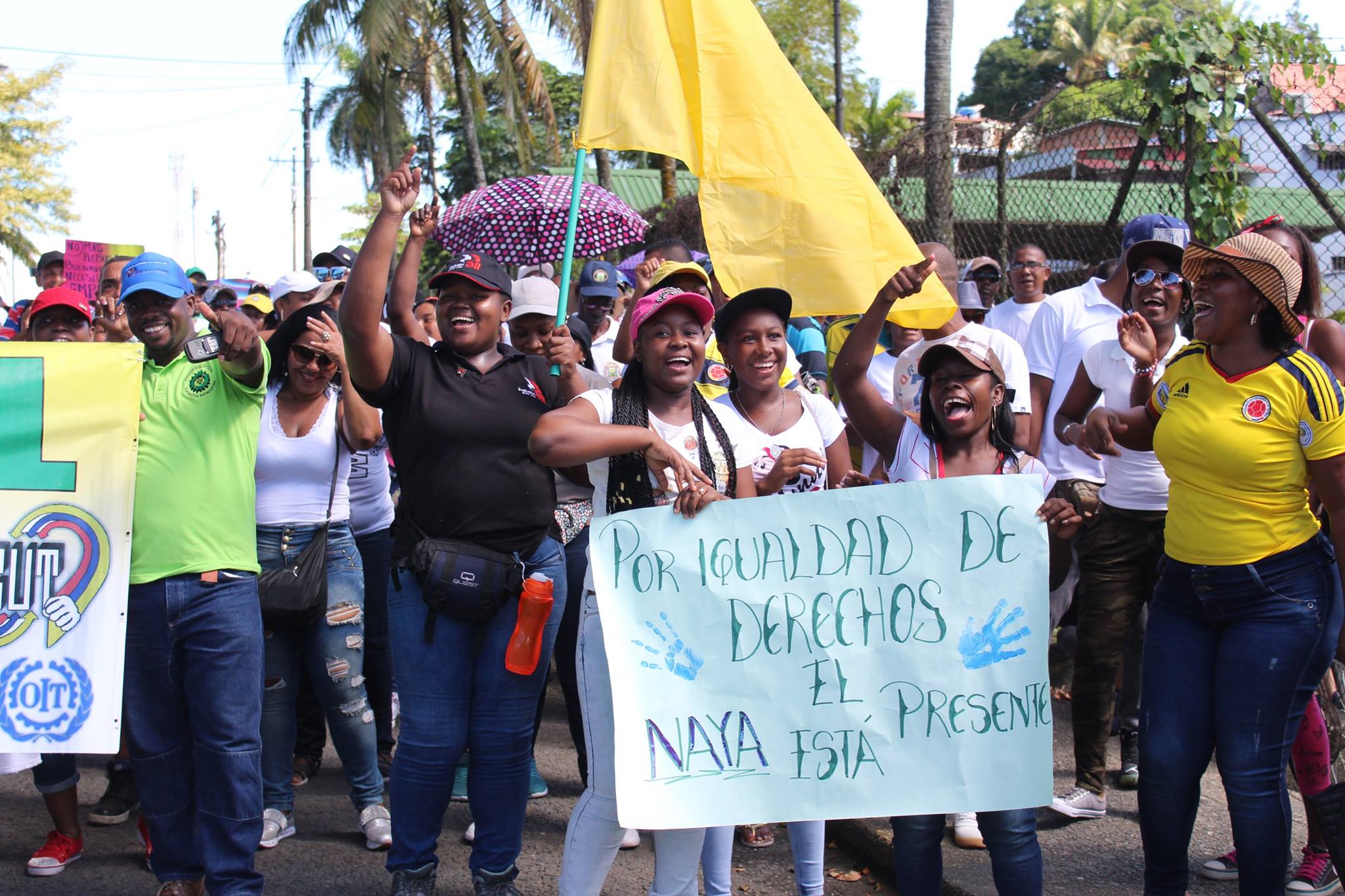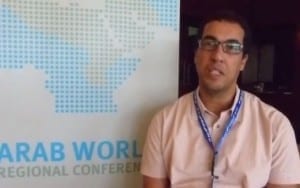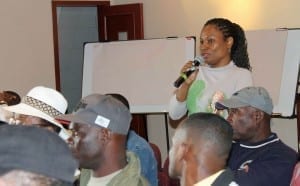
May 25, 2017
The Colombia Port Workers’ union is calling on the Ministry of Labor to follow up on promises it made during a congressional hearing this week and resume discussions with the union and the Buenaventura Port Society over formalizing 3,500 illegally outsourced workers in Buenaventura, Colombia’s largest port.
Solidarity Center union partners, organized within the Mesa Inter-Sindical coordinating body in Buenaventura, facilitated this week’s meeting in the Senate. The Solidarity Center has helped union partners to establish and build relationships with congressional allies, including Sen. Antonio Navarro, who visited the port in Buenaventura at the invitation of the port workers’ union in February.
The union (Unión Portuaria) is seeking an accord with the Port Society and government that establishes direct, indefinite employment contracts that include family-supporting wages, health care, severance, pension benefits and coverage by the union’s collective bargaining agreement.
Like the port workers, most workers in the city are classified as informal economy workers and excluded from the country’s labor protections, toiling in jobs that lack a minimum wage, workplace safety and other fundamental protections.
400,000 Residents Lack Clean Water, Electricity
Buenaventura accounts for 60 percent of the country’s maritime trade and in 2014, generated $2 billion in tax revenue. Yet the 400,000 residents, more than 90 percent of whom are of African descent, live in grinding poverty. Buenaventura residents lack even the most basic services, including access to clean water, reliable electricity and functioning sewage systems. Health care, housing and the education system are also substandard. The city’s three past mayors are in prison for embezzling public funds.
The port workers’ union, in coalition with 66 civil society organizations in Buenaventura, are also calling on the Colombian government to fulfill promises it made to residents in 2014 regarding access to basic services and decent employment. Residents have waged a civic strike in response to government inaction, bringing commerce and port operations to a halt.
Since May 16, tens of thousands of peaceful protesters have taken to the streets to demand dignity and peace. Over the weekend, police attacked the peaceful protesters, killing at least one demonstrator and injuring dozens more, including children.
Protesters vow to continue the strike until the government meets their demands, including:
- Access to basic sanitation, infrastructure, and community-run public utility services.
- Access to preventative healthcare, quality treatment and traditional medicine.
- Passage of legal and political measures to generate decent jobs, labor formalization with direct hiring relationships, and the elimination of outsourcing and employment insecurity.
Sep 25, 2014

Said El Hairech, general secretary of the National Union of Port Workers, jailed for union activity in 2012 is now celebrating a new bargaining pact. Credit: ITF
Dock workers in Tangiers, Morocco, successfully negotiated a collective bargaining agreement yesterday after a two-year struggle for worker rights that involved the wrongful arrest of union leaders for union activity and an international campaign to free the two men.
Significantly, the new pact with the global port operator APM Terminals includes respect for trade union rights along with a commitment to social dialogue, according to Said El Hairech, general secretary of the National Union of Port Workers (Union des Syndicats des Transports), an affiliate of the Moroccan Labor Union (UMT) and of the International Transport Workers’ Federation (ITF). The agreement with APM, a global network that employs 20,300 employees in 67 countries with interests in 70 port and terminal facilities, also improves working conditions and paid time-off for trade union representatives.
“This CBA embodies what we want—dynamic economic and social objectives,” said El Hairech, who also is chairman of ITF’s Arab World Regional Conference.
In 2012, El Hairech and Mohamed Chamchati, general secretary of UMT’s Merchant Seafarers’ Union, were arrested and imprisoned before eventually being released in October and November after the ITF launched a global solidarity campaign in support of the two men. The Solidarity Center worked to raise awareness about the campaign along with the UMT, a longtime ally.
The cargo port of Tangier-Med is a flagship development project for Morocco that has attracted significant international investment, and El Hairech says the agreement makes it clear that “union and management are working towards a common goal here: ambitious economic expansion in the framework of a common perspective on social responsibility.”
Feb 28, 2014

Some 127 labor activists took part in the second Afro-Colombian Labor Council conference in Bogotá. Credit: Rhett Doumitt
Ready to power forward with new grassroots organizing and mobilization outreach, 127 Afro-Colombian labor and community leaders met in Bogotá in recent days for the second national forum of the Afro-Colombian Labor Council (CLAF).
During the two-day gathering, Afro-Colombian labor rights activists shared the organization’s successes—among them, the amazing growth of the Domestic Service Workers’ Union (UTRASD) from a locally based group in the city of Medellín to a nationwide organization with 250 women.
A quarter of Colombia’s population is Afro-descendant, yet Afro-Colombians comprise more than 50 percent of the country’s poor. Formed in July 2012, CLAF is the first national organization to explicitly tackle the exploitive working conditions that most Afro-descendants suffer. Since its launch, CLAF has expanded from a national coordination board to an organization with 10 local chapters across Colombia, including Bogotá, Cartagena, Santa Marta, Urabá, Valle del Cauca, Medellín and Buenaventura.
“When you build things collectively, then everyone takes ownership of them,” said Agripina Hurtado, president of the CLAF executive board. “We need to promote the vision of where we are going—grow, connect and advocate around the challenges facing all Afro-Colombians.”
The non-governmental organization Escuela Nacional Sindical (ENS) presented research on working conditions in predominantly Afro-Colombian economic sectors, such as construction, domestic work, and ports, where ENS researchers found extreme levels of labor informality. Afro-Colombians are far likelier than other Colombian workers to earn less than the minimum wage and to be employed in jobs where they cannot form unions to improve their working conditions.
Leaders and activists at the meeting, held with the support of the Solidarity Center and the International Labor Organization (ILO), developed a three-pronged work strategy focusing on organization building, public policy advocacy and formalization of work.



